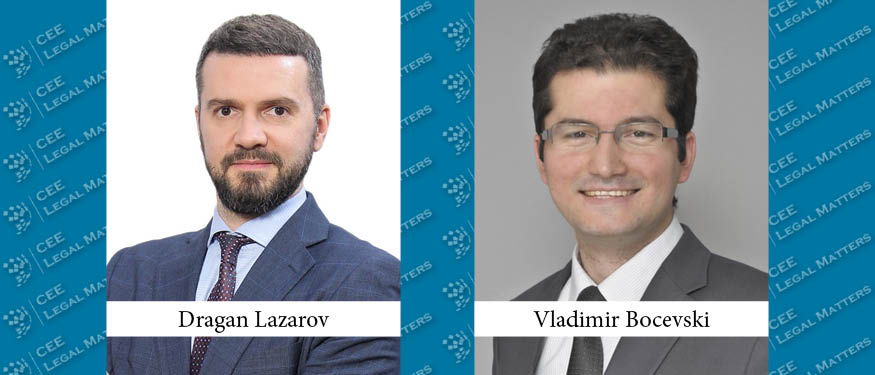Foreign direct investment in North Macedonia has surged in recent years, with 2024 marking a particularly strong period for inflows, despite global uncertainties such as supply-chain disruptions and regional economic slowdowns, according to Law Office Lazarov Managing Partner Dragan Lazarov and Cakmakova Advocates Junior Partner Vladimir Bocevski.
Inside Insight: Interview with Ana Zakovska of IT Labs
IT Labs Group General Counsel and DPO Ana Zakovska discusses her transition from private practice to in-house roles in the ICT sector, the evolving nature of legal work, and how privacy and AI are shaping the industry.
Know Your Lawyer: Emilija Apostolska of Apostolska Aleksandrovski & Partners
An in-depth look at Emilija Apostolska of Apostolska Aleksandrovski & Partners covering her career path, education, and top projects as a lawyer as well as a few insights about him as a manager at work and as a person outside the office.
North Macedonia: Outsourcing – Employment Issues
Outsourcing involves a transfer by a business (customer) to a third party (supplier) of the operational responsibility for the provision of a distinct business function, process, or service. Given the inherent transfer of responsibility, many outsourcing arrangements involve a transfer to the supplier of those employees who were engaged by the customer in the activity that is being outsourced. Macedonian law does not specifically regulate outsourcing transactions. Nonetheless, the Macedonian Law on Labor Relations 2005 (Labor Law) is harmonized with the EU Transfer of Undertakings Protection of Employment Directive 2001/23/EC of 12 March 2001 (TUPE) and, therefore, applies to the transfer of employees both on the initial outsourcing and on any subsequent or second-generation outsourcing.
New Energy Law in North Macedonia
On May 21, 2025, the new Energy Law was published in the Official Gazette of the Republic of North Macedonia, adopted by the North Macedonia Assembly on May 14. This systemic and reform-oriented law marks a pivotal step in the transformation of the national energy sector, aligning it with European standards, sustainable development goals, and consumer protection principles.
North Macedonia Adopts New Law to Regulate Seasonal and Occasional Employment
In a progressive move towards formalising seasonal and occasional work, the Assembly of North Macedonia has adopted a groundbreaking law to regulate temporary employment across key sectors. This legislative development aims to streamline the hiring process for temporary workers while ensuring they receive essential social security benefits.
New Energy Law in North Macedonia – Major Novelties for Development of Energy Capacities
Starting from 29 May 2025 a new Energy Law starts to apply in North Macedonia. This new regulatory framework serves for transposition of the Clean Energy Package into the national legislation and introducing major novelties, such as new development process for energy generation and storage capacities, integration of e-mobility to the electricity grid, additional possibilities for development of natural gas and heating networks, etc.
New Amendment Eases Data Transfer Rules from North Macedonia to NATO Nations
On 14 May 2025, significant changes were made to North Macedonia’s personal data protection legislation. The Assembly of the Republic passed an amendment to expand the nations where personal data can be shared freely, without facing third-country transfer restrictions.
Settlement in Misdemeanor Proceedings: A Modern Tool for Efficient Legal Sanctioning of Legal Entities
The institute of settlement, within the scope of misdemeanors, was introduced into Macedonian legislation by the Misdemeanor Act in 2019. In the context of overburdened courts, all mechanisms that facilitate judicial processes are more than welcome.
The Epidemic of Generic: The Problem with Law Firm Messaging
Big law firms can coast on boring slogans. They’ve got the clout, the infrastructure, and the impressive list of past clients to do the talking. But if you’re a smaller firm and your website sounds like everyone else’s, you are disappearing into the beige background of legal marketing noise.
Consumer Protection and Competition in North Macedonia: A Buzz Interview with Ana Pepeljugoska of Law Office Pepeljugoski
North Macedonia’s new government has sparked a wave of legal and regulatory changes, with renewed competition enforcement while updates in consumer protection, energy, construction, and copyright raise new questions, according to Law Office Pepeljugoski Partner Ana Pepeljugoska.
Why Most Law Firm Websites Won’t Meet the 2025 Accessibility Deadline
The European Accessibility Act (EAA), approved in 2019, takes effect on June 28, 2025. The Act requires a wide range of products and services – such as consumer electronics, vending machines, websites, and mobile apps – to meet accessibility standards for people with disabilities.
Legal Opinions in North Macedonia’s SEPA Credit Transfer Accession
North Macedonia’s formal accession to the Single Euro Payments Area (“SEPA”) marks a significant step toward deeper European financial integration. Following the European Payments Council’s (“EPC”) decision in early 2025 to extend SEPA’s geographical scope to include the Republic of North Macedonia, commercial banks and other payment service providers (“PSPs”) based in the country are now eligible to join the SEPA Credit Transfer (“SCT”) scheme. This milestone will enable citizens and businesses in the Republic of North Macedonia to send and receive euro payments under the same efficient and standardized conditions enjoyed across the SEPA area.
Macedonian Competition Commission Stepping Up Its Enforcement Efforts
In the last few months, the Commission for Protection of Competition of the Republic of North Macedonia (the “Commission”) has stepped up its enforcement efforts of antitrust rules and food supply chain practices in the country.
Is Expropriation a Legally Justified Mechanism for the Protection of the Public Interest?
Expropriation is the process of taking or limiting ownership and other property rights over real estate for the purpose of realizing a public interest as defined by law. In the Republic of North Macedonia, this process is regulated by a specific Law on Expropriation.
Balancing the Scales: North Macedonia’s New Law on Unfair Trading Practices
North Macedonia has taken a significant step in regulating market competition with the enactment of the Law on the Prohibition of Unfair Trade Practices in the Supply Chain of Agricultural and Food Products (Law).
CEE Legal Matters Comparative Legal Guide: Bribery & Corruption 2025 is Now Out!
CEE Legal Matters is proud to introduce the latest in our Comparative Guides series. This one focuses on Bribery & Corruption in CEE.
Bribery and Corruption in North Macedonia
Contributed by Law Office Emil Miftari.




























